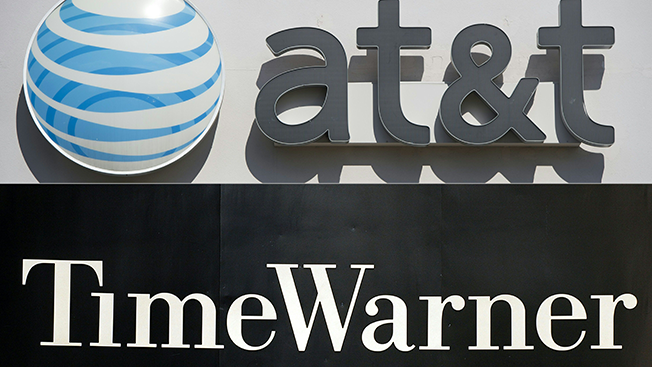
After a report just two days ago that AT&T and Time Warner had engaged in "informal" talks about a possible merger, the two companies have reached a deal in which the telecommunications powerhouse will buy Time Warner for $107.50 per share, or about $85 billion, half in stock, half in cash. The deal was officially announced tonight in a video message from Time Warner CEO Jeff Bewkes.
"The driving force," said Bewkes, "is not cost savings it's growth opportunity."
The new behemoth will combine Time Warner's hefty film and TV properties (including Warner Bros., HBO, TNT, TBS and CNN) and AT&T's robust broadband (U-Verse), wireless (AT&T) and satellite (DirecTV) offerings.
AT&T has a market capitalization of around $230 billion, while Time Warner is valued at $70 billion.
It's the biggest media merger since Comcast's acquisition of NBCUniversal in 2013.
After AT&T's unsuccessful attempt to acquire T-Mobile in 2011, the company shifted its focus to video, acquiring DirecTV last year for $48.5 billion.
As TV viewing habits have rapidly shifted in recent years, owning content is becoming even more important than distributing it, and AT&T CEO Randall Stephenson had been looking to add more original content. The Time Warner deal offers a variety of intriguing possibilities to entice cord cutters, cord shavers and cord nevers. Bewkes acknowledged as much tonight, saying it was a driving force behind a deal.
"This combination is going to put us in an even stronger position to go where our audiences are going," he said. "Joining forces with AT&T gets us, and them, there faster and better than either of us could do on our own."
Assuming the deal withstands regulatory scrutiny, many questions surround the new company that comes out of the surprise megamerger. Here are three of the biggest:
How will the combined content portfolio be organized?
While Time Warner has the bulk of the film and TV properties, the new company will have to decide what to do about AT&T's Audience Network, which is available to DirecTV and U-Verse subscribers but offers many shows—like mixed-martial-arts drama Kingdom—that would seem right at home on the rebranded, grittier TNT.
Its various sports deals will also require attention. Turner has long-term rights to March Madness, NBA and MLB games, and had early talks with the NFL about this season's Thursday Night Football package, which was ultimately split between CBS and NBC. But the combined company also has DirecTV's lucrative NFL Sunday Ticket package. AT&T will have to determine whether those sports deals are more valuable separately—NFL Sunday Ticket is a major contributor to DirecTV's subscriber base—or together, where they power a sports network offering that could go head-to-head with ESPN.
AT&T might want to look at how Comcast successfully merged its own networks (E!, Golf Channel and what was then called Versus) into NBCUniversal's portfolio.
No matter how things shake out, Peter Chernin, who previously ran Fox Broadcasting, 20th Century Fox Television and Fox Filmed Entertainment, could take on a major role overseeing the combined companies' content operations, according to the Hollywood Reporter. In 2014, Chernin Group formed a joint venture with AT&T called Otter Media to create and acquire media and digital brands.
Will the company want dueling streaming skinny bundles?
The interest in over-the-top—or OTT—services has intensified as companies look to entice the 20 million U.S. households without a pay TV subscription. The new company will find itself with competing streaming services offering skinny bundles of network and cable channels, both of which are expected to launch within in the next several months. Time Warner bought a 10 percent stake in Hulu last August, and as part of that deal, the company's Turner portfolio of networks will be available on Hulu's new livestreaming service set to launch early next year.
But AT&T already has its own skinny-bundle streaming service coming by the end of 2016. Called DirecTV Now, its subscribers will be able to stream more than 100 channels without a long-term contract or any hardware (like a set-top box) on their phones, tablets and connected-TV devices like Roku. Will there be room for both services?
What huge deal is next?
Megamergers like AT&T and Time Warner's frequently send other media companies on shopping sprees to catch up, whether via friendly acquisition or hostile takeover. CBS Corp. and Viacom are already looking into recombining after the two split a decade ago.
But in the rush to keep pace with AT&T-Time Warner, other companies that could be in play now include 21st Century Fox (which made a failed $80 billion bid for Time Warner in 2014, when Time Warner said the $85-per-share offer was too low), Disney, Verizon (which made a $4.8 billion deal for Yahoo in July), Apple, Google and Amazon. Media companies like Netflix, Discovery Communications, AMC Networks and Scripps Networks Interactive should see a lot of interest for those potential buyers in the coming weeks and months.